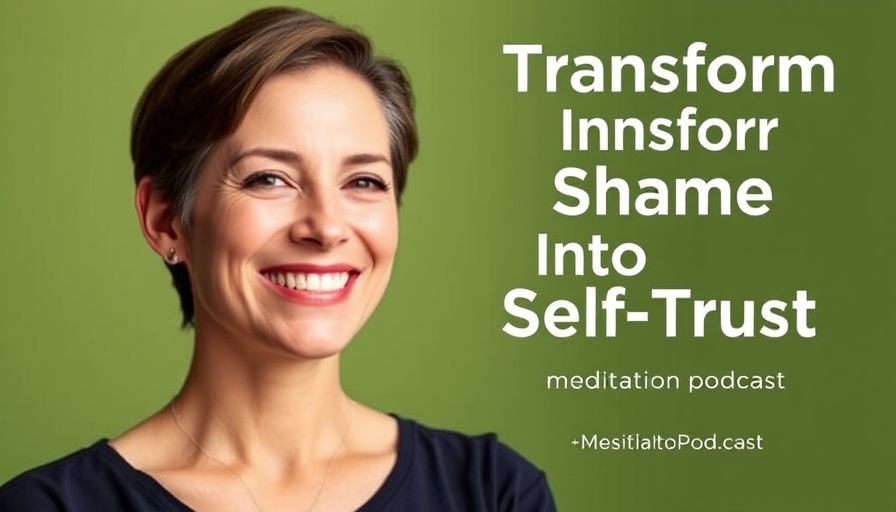
Overcoming Shame Through Mindfulness
Shame can often feel like a heavy weight, pressing down on our ability to trust ourselves and connect with others. In the journey of mindfulness, exploring difficult emotions, particularly shame, can be a transformative experience. Much like navigating a new city, this practice encourages us to explore our inner world with curiosity and gentleness. Dr. Patricia Rockman’s 12-minute meditation gives us a structured approach to face these uncomfortable feelings, fostering resilience, self-knowledge, and ultimately, self-trust.
Understanding Shame: A Common Emotion
Shame is a universal human experience. It can stem from social situations, personal experiences, or societal pressures. Often, when we experience shame, we feel isolated as if we are the only ones struggling with it. Recognizing and acknowledging these feelings is the first step in diminishing their power over us. By exploring the roots of our shame, we can dismantle the belief that we are alone in this feeling.
The Importance of Mindful Awareness
Mindfulness serves as a bridge between experiencing shame and transforming that experience into a more profound understanding of ourselves. When we practice mindfulness in yoga, we cultivate an environment of acceptance toward all emotions—good and bad. Learning to sit with discomfort, rather than flee from it, can lead to greater emotional resilience. According to research, incorporating mindfulness into daily practices can decrease anxiety and foster a sense of calm.
How to Practice Mindfulness to Transform Shame
To begin dismantling the shame you might feel, find a comfortable seated position and close your eyes if that feels comfortable. Focus on your breath, paying attention to the sensations in your body. Allow yourself to become aware of feelings of shame that arise. Label them gently—“shame is here.” Allow thoughts and bodily sensations to exist without judgment. This self-acceptance is the first step toward building a more robust sense of self-trust.
Insights from Studies on Mindfulness in Yoga
Recent studies have illustrated the powerful role that mindfulness plays in our mental health. Research indicates that yoga, combined with mindfulness practices, can significantly reduce stress and improve overall well-being. The practices promote a rejuvenating experience, helping participants reshape their relationship with negative emotions. By committing even a short time each day, like Dr. Rockman’s 12-minute meditation, individuals can cultivate lasting change in how they perceive and process their feelings.
Transforming Shame Into Self-Trust
Transforming shame into self-trust does not happen overnight; it requires patience and consistent practice. Each time we consciously acknowledge our feelings—especially uncomfortable ones like shame—we affirm that we are resilient beings capable of growth and healing. This practice ultimately helps develop a stronger relationship with ourselves, enhancing our ability to connect genuinely with others.
Your Path to Healing
Incorporating mindful body yoga practices into your routine can offer additional strategies for battling shame. Techniques such as breath awareness and gentle movements can help ground you in the present moment, making it easier to deal with overwhelming emotions. Over time, these practices can facilitate a smoother path to healing.
Embracing Vulnerability
Recognizing shame begins a powerful journey of reclaiming your narrative. Consider famous figures like Brené Brown, who emphasize vulnerability as a strength, not a weakness. This affirmation encourages individuals to be open with their emotions, thereby enhancing our capacity for empathy and connection.
Steps You Can Take Today
If you’re looking to incorporate mindfulness into your life, consider beginning with Dr. Rockman’s meditation. Create a quiet and inviting space, free from distractions, and dedicate just a few minutes each day to this practice. Engage in journaling afterward, allowing thoughts and feelings to flow freely. You might be surprised by the insight this brings about your experiences with shame.
Moving Forward
As you navigate your feelings of shame, remember that you are not alone in this journey. Seeking the support of friends, family, or a professional can provide additional perspectives and insights. The process of transforming shame into self-trust is not only valuable for personal well-being but also enhances our connections with others.
Your Invitation to Start Practicing Mindfulness
Transforming how we respond to shame is a rewarding endeavor, and it begins with a simple commitment to mindfulness. By embracing strategies such as those outlined in this article, you can foster positive change in your life. Start your journey today and discover the empowering effects of mindful awareness on your path to self-discovery and trust.
 Add Row
Add Row  Add
Add 




Write A Comment